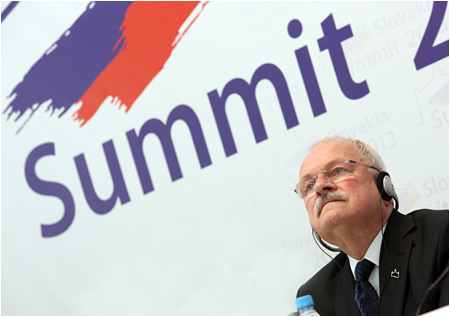
In his concluding remarks, the host of the summit, Slovak President Ivan Gašparovič, said the summit was a unique forum of this kind where participants discuss principal and highly topical issues, including the ways to tackle various problems with which the countries grapple – irrespective of whether they are EU member states, candidate countries or the countries aspiring for EU membership. The President of the Slovak Republic also spoke about the mounting problems, mainly in the social sphere, with which the citizens are confronted as a consequence of the anti-crisis measures, and called for the application of such anti-crisis measures which ensure that “our citizens do feel the benefits of economic growth. People must understand what politicians are doing”, he emphasised. The President highly appreciated that the resumé of the summit was, as he put it, that despite the existing serious problems and inevitable reforms and changes, all the countries present clearly supported the project of the European Union as a common platform which is capable of multiplying the synergic effects of a common approach towards problem solving.
The doyen of the summit, Austrian President Heinz Fischer, thanked for the organisation of this exceptional forum and expressed his delight over the positive atmosphere of the summit which provided an ample forum for a very useful exchange of views among the participating heads of states. He emphasised that “each country should tackle these problems taking into account its own national specificities.” Heinz Fischer specifically appreciated the presence of the highest representatives of Kosovo and Serbia, who were able to listen to each other, which opens new opportunities for further discussion.
Lithuanian President Dalia Grybauskaitè also thanked the organisers for the “excellent organisation of the summit” which, she said, represented “a significant contribution to EU member states, associated countries, and the Balkan countries. The European Union is open to anyone who is prepared for integration and who is willing to do the homework that goes with it.”
Romanian President Traian Basescu thanked the host for hospitality and excellent organisation of the summit. He especially appreciated communication between the representatives of Serbia and Kosovo. “Twenty countries showed political wisdom”, he said. The problems associated with the inevitable reform measures and cuts in expenditures are easier to solve through common effort by the largest number of countries possible. Traian Basescu underscored the necessity to deepen integration and put specific emphasis on major regional projects, for example the Danube Strategy or the Nabucco project, which must be put through in the process of EU budget negotiations and adoption.
Polish President Bronislaw Komorowski also thanked the summit organisers and congratulated the Slovak Republic on the successes it had achieved during the 20 years of its independence, also thanks to EU membership. ”The European project must remain attractive for EU member states and for those aspiring for membership”, he said. He also mentioned a need for a thorough reform of the Union and, on behalf of Poland, supported Ukraine in its ambition to gain EU membership. He described the 18th Central Europe Summit as “a hope and trend for the future”.
In his concluding remarks, Hungarian President János Áder underscored mutual interconnection of the core themes of the summit, crisis – integration – solidarity, particularly in the context of ability to offer concrete solutions to a common problem, namely the floods. “Can the EU be expected to help as expeditiously as it did when it intervened to help the banks?!” János Áder asked. During the discussions, he suggested a common approach towards solving current problems in order for EU institutions to be more effective and the European Solidarity Fund be accessible also to non-member states.
In his closing remarks, President Ivan Gašparovič appreciated the consensus with which the participants highlighted the importance of the positive outcome of the Vilnius Summit (November 2013) in terms of brining the Eastern Partnership countries closer to the EU. “I am most pleased to conclude that our meeting has again confirmed the added value of such a presidential format in terms of facilitating direct dialogue between and among the heads of states from our region – EU members, candidates and partners. We are facing similar challenges, but the answers and solutions must respect the differences and specificities of each and everyone of us.” Ivan Gašparovič said in conlcusion of the 18th Central Europe Summit.